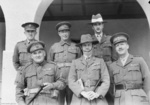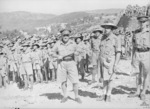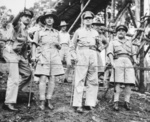Arthur Allen
| Surname | Allen |
| Given Name | Arthur |
| Born | 10 Mar 1894 |
| Died | 25 Jan 1959 |
| Country | Australia |
| Category | Military-Ground |
| Gender | Male |
Contributor: Morgan Bell
ww2dbaseArthur Allen's rotund appearance earned him the nickname "Tubby" amongst his fellow officers in the Australian Army. While this moniker conjured visions in one's mind of a cuddly, harmless teddy bear, this could not be further from the truth. When Thomas Blamey was appointing brigade commanders for the 6th Division, Allen was one of the three officers chosen. As the 6th Division played a pivotal role in the drive from Cairo westward along the Mediterranean coast of North Africa, scattering substantial Italian forces before them, Allen's 2/16 Brigade spearheaded the assault on the first coastal town encountered, Bardia. The 2/16 Brigade, and its commander, gained a fearsome reputation as they remained on the forefront of the Allied offensive all the way to Benghazi (a distance of 800 kilometres). Despite the strategic errors of British command, Allen and the 2/16 Brigade retained their reputation in the ill-fated Greek campaign, so on 18 June 1941 Blamey promoted Allen to the rank of major-general and appointed commander of the 7th Division. Allen and his new division faced difficult conditions in Syria, before Churchill decided to send the 6th and 7th Divisions back to the Far East, but Curtin, upon the advice of the Australian military chiefs, insisted that those AIF divisions return home post haste. After their arrival in their homeland, Allen and the division under his command contributed to the difficult fighting in the jungle of Papua New Guinea.
ww2dbaseArthur Samuel Allen was born in Hurstville, a suburb of Sydney, in 1894. He attended Hurstville Superior Public School before gaining work as an audit clerk with the NSW Government Railways. He then served in the 39th Battalion of the militia, but not commissioned until 1913. He was appointed to the First AIF on 24 June 1915, embarking with reinforcements for the 13th Battalion in August, bound for Egypt. In March 1916 he was promoted to captain and assigned the 45th Battalion. He arrived in France on 8 June 1916 and fought at Pozeres in August. He remained leading in the front line in the Battle of the Somme during 1917, as well as through the Battle of Messines in June. The following month Allen's leadership despite heavy casualties was officially recognized when he received the Distinguished Service Order and was promoted to the rank of major. He attained the rank of lieutenant-colonel in command of the 48th Battalion, which he led at Monument Wood. He was awarded the French Croix de Guerre for his service on the Western Front, but his appointment with the AIF ended on 10 November 1919. He became an accountant after the war and married Agnes Blair in 1921. He remained active in the militia, attempting to simultaneously live as a civilian and a soldier. In 1933 he was made a full colonel in command of the 14th Brigade. In 1938 he was promoted to brigadier, attaining the command of the 2/16 Brigade, that earned him such a high military status, in October 1939. By the time he returned to Australia in March 1942, Allen was one of the few officers in the Australian Army who had commanded, through both world wars, men from platoon level, through company, battalion, and finally divisional level. Unfortunately Allen was relieved of the command of the 7th Division on 29 October due to Blamey and MacArthur's squabbling during the Kokoda campaign. He was replaced by George Vasey. Later in that month Allen was made Knight Commander of the Order of the British Empire. The official historian observed that Allen was:
ww2dbaseAfter the war he became a senior partner in an accountancy firm. Passing away in 1959, Allen was given a military funeral, after which he was cremated. He was survived by his wife and two sons.
ww2dbaseSources: P. Brune, A Bastard of a Place: Australians in Papua, Australian War Memorial, J. Beaumont, Australia's War: 1939-45.
Last Major Revision: Apr 2009
Photographs
 |  |  |
Arthur Allen Timeline
| 10 Mar 1894 | Arthur Allen was born. |
| 25 Jan 1959 | Arthur Allen passed away. |
Did you enjoy this article or find this article helpful? If so, please consider supporting us on Patreon. Even $1 per month will go a long way! Thank you. Share this article with your friends: Stay updated with WW2DB: |
Visitor Submitted Comments
5 Mar 2015 06:16:00 PM
it is awesome great info
6 Apr 2016 10:14:06 PM
Tubby Allen was a great soldier. His treatment by MacArthur and Blamey was a disgrace. History showed that he had the plan to halt and repulse the Japanese, one that Vasey later implemented.
All visitor submitted comments are opinions of those making the submissions and do not reflect views of WW2DB.
» Campaigns in the Middle East
» New Guinea-Papua Campaign, Phase 3
- » 1,150 biographies
- » 337 events
- » 44,024 timeline entries
- » 1,241 ships
- » 350 aircraft models
- » 207 vehicle models
- » 375 weapon models
- » 123 historical documents
- » 260 facilities
- » 470 book reviews
- » 28,568 photos
- » 432 maps
Fleet Admiral Chester W. Nimitz, 16 Mar 1945
Please consider supporting us on Patreon. Even $1 a month will go a long way. Thank you!
Or, please support us by purchasing some WW2DB merchandise at TeeSpring, Thank you!
28 Aug 2013 05:33:05 AM
Memoirs of soldiers who fought in New Guinea show that General Allen, and his predecessor, Brigadier Potts (who had been dismissed despite his efforts in defence of the Kokoda trail) were highly regarded by their men. But back in Australia MacArthur and Blamey thought that he was advancing too slowly, rarely threatening to overtake the retreating Japanese, and had him dismissed. Blamey, whilst undoubtedly a brilliant Staff Officer, did not once visit the front line and had no concept of the difficulties that his men were experiencing in the rugged and inhospitable terrain.